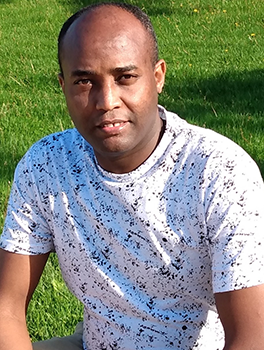Tilahun Fikadu
"I don’t want to be someone who simply advocates for environmental protection, but I want to be involved with that decision-making process.”

Tilahun Fikadu is an Urban Ecologist with a special interest in Urban Sustainability. As a PhD student at Taubman College of Architecture and Urban Planning, he is interested in developing multi-functional urban green spaces in Sub-Saharan Africa. He is also a CEW+ 2022-2023 Grace A. and James D. Bruce Community Engagement Scholar. Currently, he is conducting research to help develop a more comprehensive and multi-criteria-based green space planning strategy for improving the social usability and ecological functionality of urban green spaces in the region. Tilahun joins CEW+ to tell his unique story.
Tilahun is passionate about his work largely due to his background. He is from Addis Ababa, the capital of Ethiopia, and is interested in finding a solution to the most pressing problems in today’s society. Most importantly, he approaches these challenges from an ecological standpoint, considering societal needs while considering the optimal course of action for the environment. Initially pursuing Applied Biology for his bachelor’s degree out of sheer curiosity about nature, he encountered various environmental predicaments that sparked his desire to delve deeper into the subject. This led him to embark on a master’s degree in environmental science in Europe. “In Europe, I was exposed to diverse environmental problems, not just in the context of Africa but at the global scale, and that helps me to find the commonalities in these problems and envision comprehensive solutions that transcend geographical boundaries.” Here, he also learned the saying by which he now learns and lives, “think globally and act locally.”
Now his PhD research focuses on integrating nature in urban areas, and Tilahun is learning all of this in relation to urban planning. Planning is a process that makes the most important decisions, “if you make a change in planning, you can make a change on the ground. I don’t want to be someone who simply advocates for environmental protection, but I want to be involved with that decision-making process.” Tilahun is conducting research at U-M that focuses on developing multi-functional green spaces, which can be defined differently, but according to his research, multifunctionality is increasing the capabilities of green spaces to provide as many social and ecological benefits. He emphasized the disconnect between planners who often overlook conservation’s significance and ecologists who disregard the recreational benefits of green spaces. Consequently, Tilahun’s research aims to bridge the gap between urban ecologists and urban planners, thereby facilitating a comprehensive understanding of multi-functionality. He acknowledges that his approach deviates from the norms within both disciplines, yet he remains optimistic about the considerable progress and growing acceptance of his ideas among professionals.
Tilahun also has a call to action for the general public to involve themselves in the future of sustainability. We should all be aware of the benefits of public green spaces and get our maximum benefit out of them as a society. “Especially when it comes to African cities, the attachment people have with green spaces is the reason why we are losing so many green spaces.” During his childhood, he frequented numerous playgrounds. Regrettably, these once-thriving green spaces and recreational areas have since vanished, leaving today’s children with no alternative but to engage in play on streets amidst the constant presence of vehicular traffic. There is a huge demand to develop for the next generation. The ways these cities have been growing is “very alarming” according to Tilahun. “My advice is that the general public should be well aware of the benefits of public green spaces, and the communities should possess the highest power to make decisions on the green spaces that are found within their neighborhoods. Unfortunately, this is not the case, so awareness is a big factor here.”
As a CEW+ scholar, Tilahun also shared a bit about his personal life and how CEW+ is involved in it. Tilahun has a daughter and takes his personal and academic time management very seriously. His productivity is not only by his own efforts but also due to his spouse’s continuous support. He plans a lot. He manages the hassle of his academic and personal life by making a plan for everything in his life. His method entails breaking down these objectives into manageable daily tasks, thereby steadily advancing toward his overarching aspirations. This mindset resonates with the principle of “think globally and act locally.” As for CEW+, he has received support during the especially difficult COVID-19 times that affected his ability to travel and collect data from his case study cities. The support provided by CEW+ enables him to fully concentrate on his research without the need for additional employment commitments. Furthermore, it affords him the privilege of having certain health-related expenses covered. Tilahun ended his interview with remarks about CEW+ doing a lot of good things – he found the center through a Kenyan friend who received similar support. Concluding the interview, he expresses his utmost admiration for CEW+, stating, “I hold truly exceptional regard for CEW+.”

